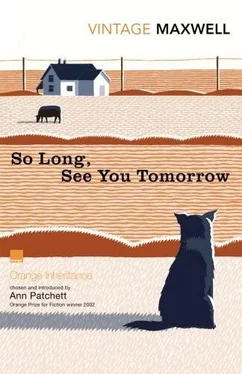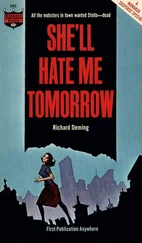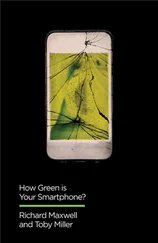William Maxwell
So Long, See You Tomorrow
The gravel pit was about a mile east of town, and the size of a small lake, and so deep that boys under sixteen were forbidden by their parents to swim there. I knew it only by hearsay. It had no bottom, people said, and because I was very much interested in the idea that if you dug a hole straight down anywhere and kept on digging it would come out in China. I took this to be a literal statement of fact.
One winter morning shortly before daybreak, three men loading gravel there heard what sounded like a pistol shot. Or, they agreed, it could have been a car backfiring. Within a few seconds it had grown light. No one came to the pit through the field that lay alongside it, and they didn’t see anyone walking on the road. The sound was not a car backfiring; a tenant farmer named Lloyd Wilson had just been shot and killed, and what they heard was the gun that killed him.
At the coroner’s inquest, Wilson’s uncle, who had lived with him for a number of years and was a man in his late sixties, testified that while he was feeding the horses he saw his nephew’s lantern as he passed on his way to the cow barn. The horse barn and the cow barn were about five hundred feet apart. He did not hear the shot and he was not aware that there was anybody on the farm that morning who did not belong there. The household at that time consisted of Wilson, his two little boys, aged six and nine, his elderly housekeeper, and the uncle, Fred Wilson.
The housekeeper then took the stand and testified that on the last morning of his life Lloyd Wilson got up at five-thirty as usual, dressed, and built two fires. While he was waiting for the one in the kitchen range to catch, he stood talking and joking with her. He was in a cheerful mood and left the house whistling. Usually he was through milking and back in the kitchen before she had breakfast ready. At seven o’clock, knowing that he had to go to town and pick up a man he had engaged to do some belated corn shucking for him, she told the younger of the two little boys to go see what was keeping his father so long. He asked for a flashlight, and she peered out into the darkness and then said he didn’t need a flashlight, he could see the lantern shining from the open door of the barn. In a very short while she heard him coming back to the house. He was crying. When she opened the storm door and called out to him, he said, “Papa is dead! He is sitting there with his eyes open but he is dead….”
Who believes in children? Brushing him and his story aside she ran to the barn. Wilson was sitting on a milking stool in the middle stall, his body sunk over against the partition. She caught him by the hand and cried, “Lloyd, what on earth is the matter with you?” —thinking he had been stricken with heart failure or possibly apoplexy. As the child had said, he was sitting there with his eyes open but he was dead.
The housekeeper and Fred Wilson did the necessary things — that is to say, she went back to the house and made a number of telephone calls, and he finished milking the cows and turned them out into the pasture and then sat beside the body until the undertaker and his assistant came and took it back to town. Rigor mortis had set in, and they had to cut the sleeve of his jacket in order to take off his clothes. They removed the jacket, coat, corduroy vest, and flannel shirt, before they saw a small red stain on the undershirt, over the heart.
In those days — I am talking about the early nineteen-twenties — people in Lincoln mostly didn’t lock their doors at night, and if they did it was against the idea of a burglar. One sometimes read in the evening paper that some man had been arrested for disorderly conduct, but that meant drunkenness. Without thinking I would have said that acts of violence could hardly be expected to flourish in a place where houses were not widely separated and never enclosed by a high wall and where it would have been hard to do anything out of the way that somebody by one accident or another or from simple curiosity would not happen to see. But consider the following sentence, from a history of Logan County published in 1911: “While there have been in the neighborhood of about fifty fatal shooting affrays…very few have occurred where the parties were well known or of considerable standing in the community.” As a rule the shooting, or the knifing, or the clubbing, was in a coal miner’s shack or a back alley or a lonely farmhouse, but one of the crimes mentioned in that book took place in a house on Tenth Street, one street over from the house we lived in when I was a child. What distinguished the murder of Lloyd Wilson from all the others was a fact so shocking that the Lincoln Courier-Herald hesitated several days before printing it: The murderer had cut off the dead man’s ear with a razor and carried it away with him. In that pre-Freudian era people did not ask themselves what the ear might be a substitution for, but merely shuddered.
II THE PERIOD OF MOURNING
I very much doubt that I would have remembered for more than fifty years the murder of f tenant farmer I never laid eyes on if (1) the murderer hadn’t been the father of somebody I knew, and (2) I hadn’t later on done something I was ashamed of afterward. This memoir — if that’s the right name for it — is a roundabout, futile way of making amends.
Before I can go into all that, I have to take up another subject. When my father was getting along in years and the past began to figure more in his conversation, I asked him one day what my mother was like. I knew what she was like as my mother but I thought it was time somebody told me what she was like as a person. To my surprise he said, “That’s water over the dam,” shutting me up but also leaving me in doubt, because of his abrupt tone of voice, whether he didn’t after all this time have any feeling about her much, or did have but didn’t think he ought to. In any case he didn’t feel like talking about her to me.
Very few families escape disasters of one kind or another, but in the years between 1909 and 1919 my mother’s family had more than its share of them. My grandfather, spending the night in a farmhouse, was bitten on the ear by a rat or a ferret and died three months later of blood poisoning. My mother’s only brother was in an automobile accident and lost his right arm. My mother’s younger sister poured kerosene on a grate fire that wouldn’t burn and set fire to her clothing and bore the scars of this all the rest of her life. My older brother, when he was five years old, got his foot caught in a turning carriage wheel.
I was so small when these things happened that either I did not know about them or else I didn’t feel them because they took place at one remove, so to speak. When my brother undressed at night he left his artificial leg leaning against a chair. It was as familiar to me, since we slept in the same room, as his cap or his baseball glove. He was not given to feeling sorry for himself, and older people were always careful not to show their sorrow over what had happened to him. What I felt about his “affliction” was tucked away in my unconscious mind (assuming there is such a thing) where I couldn’t get at it.
My younger brother was born on New Year’s Day, at the height of the influenza epidemic of 1918. My mother died two days later of double pneumonia. After that, there were no more disasters. The worst that could happen had happened, and the shine went out of everything. Disbelieving, we endured the wreath on the door, and the undertaker coming and going, the influx of food, the overpowering odor of white flowers, and all the rest of it, including the first of a series of housekeepers, who took care of the baby and sat in my mother’s place at mealtime. Looking back I think it more than likely that long before she ever laid eyes on us that sallow-faced, flat-chested woman had got the short end of the stick. She came from a world we knew nothing about, and I don’t remember that she ever had any days off. She may have made a stab at being a mother to my older brother and me, but it would have taken a good deal more than that to break through our resistance. We knew what he had had, and were not to be taken in by any form of counterfeit affection.
Читать дальше












